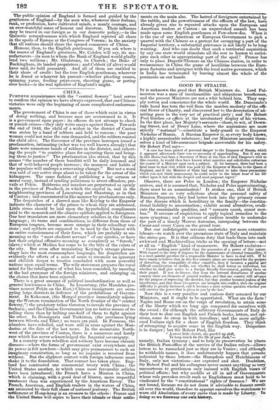GOOD BY STEALTH.
IT is unknown the good that British Ministers do. Lord Pal- merston was a man of inexhaustible and ubiquitous beneficence, and the present Ministers are not a whit behind him. They sup- ply cotton and conscience for the whole world. Mr. Duncombe s rude hand has torn the veil from the maiden modesty of the offi- cial Sister of Charity, and discovered her to the desecration of ad- miring gaze in the very act of practical piety ; and Sir Robert Peel blushes ex nfficio at the involuntary display of his virtues. In the first place, her Majesty's servants—those, to wit, of Down- ing Street, not of Drury Lane, where the aspirations are more strictly " national"—constitute a body-guard to the Emperor Nicholas of Russia. A Russian Emperor is, as every body knows, a highly assassinable substance' but our Ministers account them- selves a kind of life-assurance brigade answerable for his safety. Sir Robert Peel says- " A ease has been quoted of personal danger to the Emperor of Russia, which it appeared afterwards there was no necessity of apprehending. But if any one in this House had been a Secretary of State at the time of that Emperor's visit to this country, he would then have known what anxieties and solicitudes embarrass the course of a Minister upon such a subject. If, for instance, there had been a fatal issue to that visit which was paid by the Emperor of Russia to the Queen of R7land, and if the Minister of State had neglected to take those precautions which you now think unnecessary, he could never to the latest hour of his life reflect upon it but with the deepest and most poignant regret."
Observe, there are Poles in London ; the Emperor Nicholas arrives, and it is assumed that, Nicholas and Poles approximating, there must be an assassination ! It strikes one, that if British Ministers are so very solicitous about the personal safety of Russian Emperors, they had better look into the primary causes of the disease which is hereditary in the family—the constitu- tional liability to assassination ; exhibit moral alteratives, eradi- cate the assassmable qualities, and " cessante causti, cessat mor- bus." It savours of empiricism to apply topical remedies to the mere symptom ; and it savours of endless trouble to undertake the part of a timely Marcus Antonius, interposing between the Caesar and every Casco on the grand tour.
But our indefatigable servants undertake yet more extensive labours—to watch over the precarious state of Italy and maintain the status quo. It is that arduous duty that leads them into such awkward and Machiavellian tricks as the opening of letters—not at all an " English" kind of manceuvre. Sir Robert exclaims-
" I know nothing more painful than the possession of a power of this nature. With regard to the duty it imposes for the maintenance of external tranquillity, it is a most painful question for a responsible brmister to have to deal with. If he have reason to believe that in this free country plans are concocted for the purpose of disturbing the tranquillity of other countries, then it becomes a p,inful and difficult consideration to decide, not whether he shall betray an individual, but whether he shall give notice to a foreign friendly Government, putting them on their guard. If you do foresee, that from the internal disturbance of another country there are elements of general warfare, and that one country will advance for the purpose of repressing the disorder, but that another becomes jealous of the interference, and that those two powers are brought into conflict, then the original difficulty is greatly increased, and it becomes a most serious question whether you will exercise the power that is given to you by the law."
Now this is a very peculiar and curious duty assumed by our Ministers, and it ought to be appretiated. What are the facts ? Naples and Rome are on the verge of revolution, to attain some of the liberty which we long ago conquered for ourselves with the sword : for although the arbitrary Governments of Italy do their best to shut out English and French books, letters, and opi- nions, some do creep in with travellers and the more Antiot- ened Italians sigh for a share of English freedom. They think of attempting to acquire some in the English way. Despotism is in danger ; but Sir Robert Peel, like "A sweet little cherub, sits perch'd up aloft, To keep watch for the life of poor Jaek,"— namely, Italian tyranny ; and to help its preservation he places the British Post-office at the service of the Italian rulers—allows letters to be ransacked just as they are in Venice; and although he withholds names' it does unfortunately happen that persons indicated by those letters—the Hampdens and Hutchinsons of Italy, only not victorious—are captured and shot. Doubtless, Sir Robert Peel and his colleagues never meant anything so very uncourteous to gentlemen only imbued with English views of political affairs : but why meddle at all in aid of Governments whose rule provokes revolt such as Englishmen must hold to be vindicated by the "constitutional" rights of freemen ? We are not bound, because we do not deem it advisable to foment revolt all over the world, therefore to appoint ourselves the watchmen to warn old Absolutism of every move that is made by Liberty. In doing solve forswear our own history.


























 Previous page
Previous page